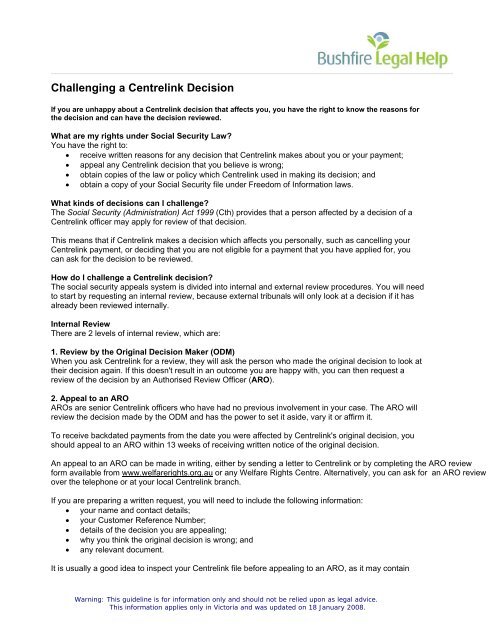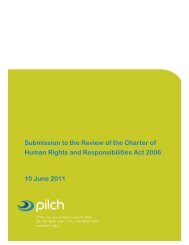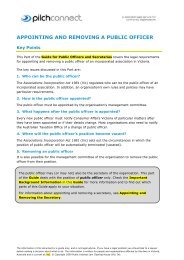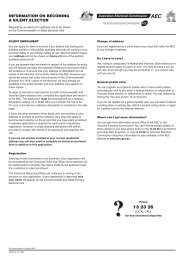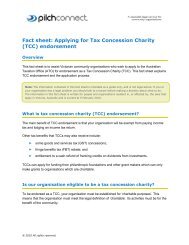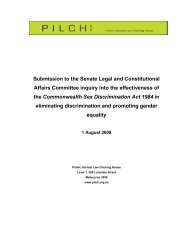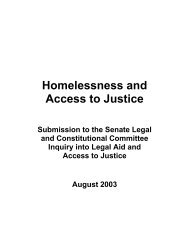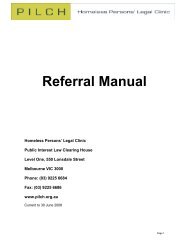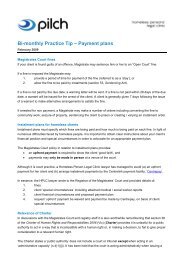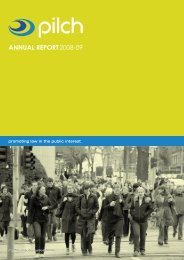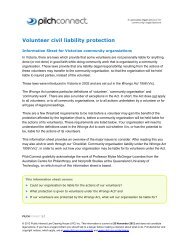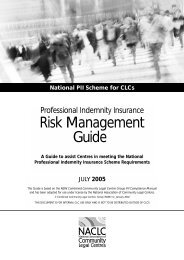Challenging a Centrelink Decision - pilch
Challenging a Centrelink Decision - pilch
Challenging a Centrelink Decision - pilch
Create successful ePaper yourself
Turn your PDF publications into a flip-book with our unique Google optimized e-Paper software.
<strong>Challenging</strong> a <strong>Centrelink</strong> <strong>Decision</strong><br />
If you are unhappy about a <strong>Centrelink</strong> decision that affects you, you have the right to know the reasons for<br />
the decision and can have the decision reviewed.<br />
What are my rights under Social Security Law?<br />
You have the right to:<br />
receive written reasons for any decision that <strong>Centrelink</strong> makes about you or your payment;<br />
appeal any <strong>Centrelink</strong> decision that you believe is wrong;<br />
obtain copies of the law or policy which <strong>Centrelink</strong> used in making its decision; and<br />
obtain a copy of your Social Security file under Freedom of Information laws.<br />
What kinds of decisions can I challenge?<br />
The Social Security (Administration) Act 1999 (Cth) provides that a person affected by a decision of a<br />
<strong>Centrelink</strong> officer may apply for review of that decision.<br />
This means that if <strong>Centrelink</strong> makes a decision which affects you personally, such as cancelling your<br />
<strong>Centrelink</strong> payment, or deciding that you are not eligible for a payment that you have applied for, you<br />
can ask for the decision to be reviewed.<br />
How do I challenge a <strong>Centrelink</strong> decision?<br />
The social security appeals system is divided into internal and external review procedures. You will need<br />
to start by requesting an internal review, because external tribunals will only look at a decision if it has<br />
already been reviewed internally.<br />
Internal Review<br />
There are 2 levels of internal review, which are:<br />
1. Review by the Original <strong>Decision</strong> Maker (ODM)<br />
When you ask <strong>Centrelink</strong> for a review, they will ask the person who made the original decision to look at<br />
their decision again. If this doesn't result in an outcome you are happy with, you can then request a<br />
review of the decision by an Authorised Review Officer (ARO).<br />
2. Appeal to an ARO<br />
AROs are senior <strong>Centrelink</strong> officers who have had no previous involvement in your case. The ARO will<br />
review the decision made by the ODM and has the power to set it aside, vary it or affirm it.<br />
To receive backdated payments from the date you were affected by <strong>Centrelink</strong>'s original decision, you<br />
should appeal to an ARO within 13 weeks of receiving written notice of the original decision.<br />
An appeal to an ARO can be made in writing, either by sending a letter to <strong>Centrelink</strong> or by completing the ARO review<br />
form available from www.welfarerights.org.au or any Welfare Rights Centre. Alternatively, you can ask for an ARO review<br />
over the telephone or at your local <strong>Centrelink</strong> branch.<br />
If you are preparing a written request, you will need to include the following information:<br />
your name and contact details;<br />
your Customer Reference Number;<br />
details of the decision you are appealing;<br />
why you think the original decision is wrong; and<br />
any relevant document.<br />
It is usually a good idea to inspect your <strong>Centrelink</strong> file before appealing to an ARO, as it may contain<br />
Warning: This guideline is for information only and should not be relied upon as legal advice.<br />
This information applies only in Victoria and was updated on 18 January 2008.
information which is useful for the review.<br />
The ARO will look at the information used by the ODM, and ensure all relevant available information<br />
was taken into account. The ARO will also check whether any new and relevant information is available<br />
and correct any mistakes that were made. When the ARO appeal is complete, the ARO will send you a<br />
letter outlining the reasons for their decision.<br />
External Review<br />
If you have completed an internal review and still believe the decision that has been made is incorrect,<br />
you can then apply for an external review. The external review process is divided into two stages:<br />
1. Social Security Appeals Tribunal (SSAT)<br />
The SSAT is an independent statutory tribunal that can review <strong>Centrelink</strong> decisions about social<br />
security, family assistance, education or training payments. Its processes are fairly quick and informal.<br />
You can apply to the SSAT for review of a <strong>Centrelink</strong> decision by sending a written application directly to<br />
the SSAT, or to any <strong>Centrelink</strong> Customer Service Centre. You can also make an application over the<br />
phone or in person at the SSAT. Appeal forms are available from any <strong>Centrelink</strong> or any SSAT office.<br />
Your application should be made within 13 weeks of the AROs decision so that you are eligible to<br />
receive backdated payments. Applications are usually heard by a panel of two members and you don't<br />
need to bring a lawyer, but you may bring along a representative to speak on your behalf.<br />
After deciding on the appeal, the SSAT must write to you with its decisions and reasons within 14 days.<br />
SSAT decisions are binding.<br />
2. Administrative Appeals Tribunal (AAT)<br />
If you are unhappy with the SSAT decision you can appeal to the AAT. <strong>Centrelink</strong> may also appeal to<br />
the AAT. Appeals to the AAT must be made within 28 days from the date you receive the SSAT decision<br />
in writing. This time limit can only be extended in limited circumstances.<br />
The AAT is a more formal body than the SSAT. After you have lodged an appeal, <strong>Centrelink</strong> will be<br />
required to lodge a statement of reasons for its decision (which will include all <strong>Centrelink</strong> documents).<br />
The AAT will then hold a conference at which you or your representative can meet with a <strong>Centrelink</strong><br />
representative. At this conference, the AAT will seek to clarify the main issues in dispute and, if possible,<br />
resolve the matter. If the matter is not resolved, both parties will then have the opportunity to present<br />
evidence and argue its case in an open hearing.<br />
<strong>Decision</strong>s made by the AAT are binding. Either party can appeal a decision of the AAT to the Federal<br />
Court, but only on a question of law.<br />
How much does it cost to appeal?<br />
There is no charge for an internal <strong>Centrelink</strong> review or for a review to the SSAT. Each party will bear<br />
their own expenses, and no costs can be awarded against you. In some circumstances your reasonable<br />
travel and accommodation costs will be paid for by the SSAT. If you appeal to the AAT, it is unlikely that<br />
you will have to pay the application fee for an appeal, however you should check this at the time you<br />
decide to appeal. Costs cannot be awarded against you if your appeal is unsuccessful.<br />
Who can I ask for assistance?<br />
If you would like to challenge a <strong>Centrelink</strong> decision, you can contact the Homeless Persons Legal Clinic<br />
(HPLC) on our free call number 1800 606 313. Please see the panel on the right for HPLC locations<br />
and times.<br />
Your local Welfare Rights Centre will also give you free, independent advice and assistance on any<br />
Social Security matter. All information that you give to a Welfare Rights officer is confidential and<br />
<strong>Centrelink</strong> will only be contacted about your case if you ask your advocate to do so. Contact details for<br />
Welfare Rights Centres around Australia are available at www.welfarerights.org.au.<br />
Warning: This guideline is for information only and should not be relied upon as legal advice.<br />
This information applies only in Victoria and was updated on 18 January 2008.
Contact details for the Melbourne Welfare Rights Centre are:<br />
155 Easey Street, Collingwood, VIC 3066.<br />
Telephone: (03) 9416 1111<br />
Fax: (03) 9419 3552<br />
Email: wruvic@vicnet.net.au<br />
Warning: This guideline is for information only and should not be relied upon as legal advice.<br />
This information applies only in Victoria and was updated on 18 January 2008.


